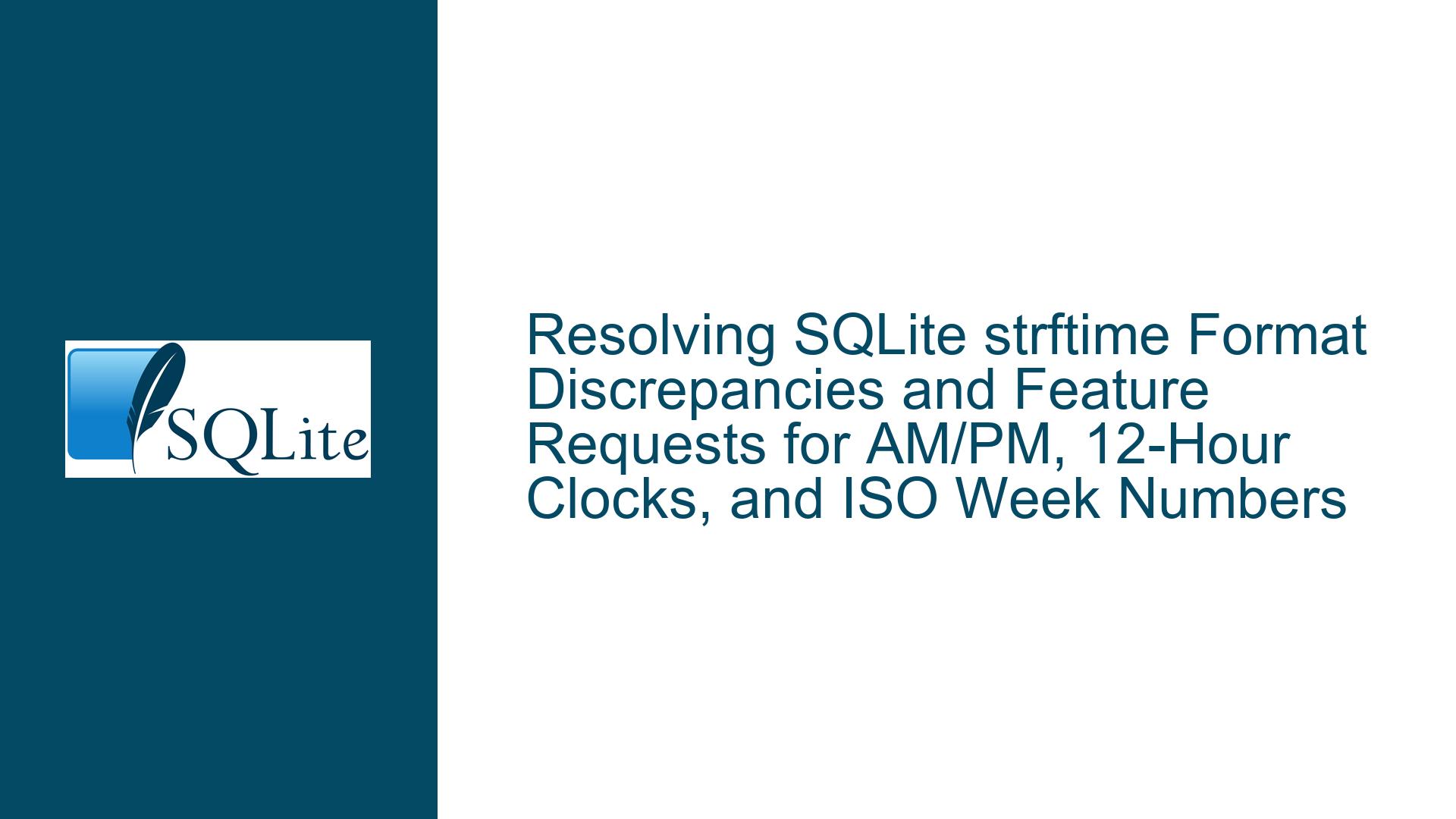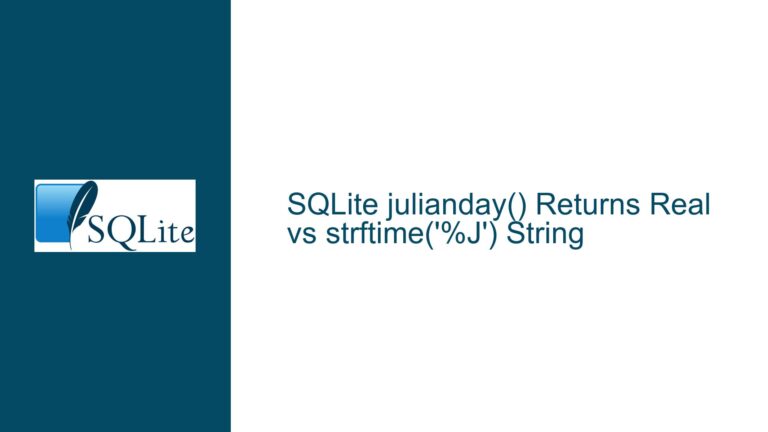Resolving SQLite strftime Format Discrepancies and Feature Requests for AM/PM, 12-Hour Clocks, and ISO Week Numbers
Inconsistent AM/PM Formatting and Missing 12-Hour Clock/ISO Week Support in SQLite’s strftime Function
Issue Overview: Conflicting Implementations of %p/%P Modifiers and Absence of Standardized 12-Hour Time/ISO Week Formats
The core issue revolves around three interrelated problems with SQLite’s implementation of the strftime function:
Case Sensitivity Inconsistencies with %p and %P Modifiers
The%pformat specifier returns uppercase "AM"/"PM" in SQLite, while%Preturns lowercase "am"/"pm". This conflicts with expectations from other implementations like Python’sstrftime(which only supports%pfor uppercase) and Linux’s C library (where%Pis a GNU extension for lowercase). Developers expect case consistency across platforms but face divergent behavior when migrating between systems.Lack of Native 12-Hour Clock Formatting Without String Manipulation
SQLite historically required convoluted expressions likeCASE WHEN CAST(strftime('%H', datetime_column) AS INTEGER) >= 12 THEN 'PM' ELSE 'AM' ENDto derive AM/PM indicators. While version 3.44 introduced%I(12-hour hour with leading zero) and%p/%P, there’s no direct equivalent to format "12" instead of "00" for midnight/noon in 12-hour notation. The original request sought%hto represent "12" when the hour modulo 12 equals 0.Missing ISO 8601 Week Numbering (%V) and Year-of-Week Formats
ISO week numbers (%V) differ from calendar weeks, as weeks start on Monday and the first week must contain at least four January days. Calculating this requires non-trivial logic absent in SQLite’sstrftime, forcing developers to implement custom solutions. The lack of%G(ISO year) compounds this issue when dealing with cross-year weeks.
These problems stem from SQLite’s design philosophy of closely mirroring the C standard library’s strftime while balancing feature requests. The tension between backward compatibility, cross-platform consistency, and developer convenience creates friction when handling localized time formatting and international standards.
Possible Causes: Historical Adherence to C strftime Standards vs Modern Formatting Needs
The root causes of these discrepancies lie in SQLite’s architectural decisions and evolving requirements:
C Standard Library Compatibility as Primary Reference
SQLite’sstrftimewas initially designed to mirror the C89 standard’s behavior, which defines%pfor locale-dependent AM/PM in uppercase. The GNU extension%P(lowercase) was later adopted but remains non-standard. This explains why%Pbehaves differently across platforms – SQLite follows the underlying C library’s implementation where it exists, leading to platform-specific inconsistencies.Deliberate Exclusion of Non-Standard Format Specifiers
Format specifiers like%h(12-hour with 00→12) and%V(ISO week) are not part of ISO C standards. SQLite maintainers have historically avoided adding non-standard extensions unless overwhelmingly requested, to prevent fragmentation. This conservatism forces developers to use workarounds like:SELECT (strftime('%I', 'now') % 12) || CASE WHEN (strftime('%H', 'now') >= 12) THEN ' PM' ELSE ' AM' END;Such workarounds are error-prone and impact readability.
Case Sensitivity in Format Specifiers
The decision to make%Poutput lowercase in SQLite (unlike Python’s lack of support for%P) stems from interpreting lowercase as the "modified" version of%p. However, this violates the principle of least surprise, as developers expect case-insensitive modifiers or consistent casing across similar specifiers.Complexity of ISO Week Calculation
Implementing%Vand%Grequires adhering to ISO 8601 rules, which involve:- Weeks starting on Monday
- The first week containing at least four days of the new year
- Year transitions where December 31 might belong to week 1 of the next year
Adding this to SQLite would necessitate significant code changes and testing across edge cases, a deterrent for inclusion without clear demand.
Troubleshooting Steps, Solutions & Fixes: Achieving AM/PM Consistency, 12-Hour Clock Adjustments, and ISO Week Workarounds
Resolving AM/PM Case Sensitivity and 12-Hour Formatting Issues
Standardizing AM/PM Case Output
To enforce consistent casing regardless of%por%P:-- Force uppercase using %p SELECT strftime('%I:%M %p', '2024-05-09 14:30:00') AS time_upper; -- 02:30 PM -- Force lowercase using lower(%p) SELECT lower(strftime('%I:%M %p', '2024-05-09 14:30:00')) AS time_lower; -- 02:30 pm -- Use %P directly if lowercase is acceptable SELECT strftime('%I:%M %P', '2024-05-09 14:30:00') AS time_lower_direct; -- 02:30 pmNote:
%Pis available starting SQLite 3.44. For older versions, combine%pwithlower().Converting 00 to 12 in 12-Hour Time
SQLite lacks a built-in modifier to display "12" instead of "00" for midnight/noon. Use arithmetic and string replacement:SELECT CASE WHEN CAST(strftime('%I', datetime_column) AS INTEGER) = 0 THEN '12' ELSE strftime('%I', datetime_column) END || strftime(':%M %p', datetime_column) AS time_12h;For SQLite 3.44+ with
%Isupport:SELECT REPLACE( strftime('%I:%M %p', datetime_column), '00:', '12:' ) AS time_12h_fixed;Leveraging New strftime Features in SQLite 3.44+
Version 3.44 introduced several format specifiers:%I: 12-hour hour with leading zero (00-12)%l: 12-hour hour without leading zero (0-12)%p/%P: AM/PM in uppercase/lowercase
Example:
SELECT strftime('%l:%M %P', '2024-05-09 00:30:00') AS time_12h; -- 12:30 am
Implementing ISO Week Number and Year Calculations
Custom ISO Week Number Calculation
Use a combination of existing modifiers and arithmetic:WITH dates AS ( SELECT '2023-01-01' AS date UNION ALL SELECT '2023-12-31' UNION ALL SELECT '2024-01-01' ) SELECT date, CASE WHEN strftime('%w', date) = '0' THEN 7 -- Convert Sunday (0) to 7 ELSE CAST(strftime('%w', date) AS INTEGER) END AS iso_weekday, (strftime('%j', date) + 7 - iso_weekday) / 7 AS iso_week FROM dates;This approximates ISO weeks but may fail near year boundaries.
Handling ISO Year Boundaries
For accurate ISO year (%G), determine if the week belongs to the previous/next year:SELECT date, CASE WHEN iso_week = 1 AND strftime('%m', date) = '12' THEN strftime('%Y', date) + 1 WHEN iso_week >= 52 AND strftime('%m', date) = '01' THEN strftime('%Y', date) - 1 ELSE strftime('%Y', date) END AS iso_year FROM ( -- Subquery with iso_week calculated as above );User-Defined Functions for ISO Support
For complex scenarios, extend SQLite using loadable extensions:#include <sqlite3ext.h> SQLITE_EXTENSION_INIT1 static void isoWeekNumber(sqlite3_context *context, int argc, sqlite3_value **argv) { // Implement ISO week logic in C } int sqlite3_extension_init(sqlite3 *db, char **pzErrMsg, const sqlite3_api_routines *pApi) { SQLITE_EXTENSION_INIT2(pApi); sqlite3_create_function(db, "iso_week", 1, SQLITE_UTF8, NULL, isoWeekNumber, NULL, NULL); return SQLITE_OK; }Compile as a loadable extension and use:
SELECT iso_week('2024-12-31') AS week_num; -- Returns 1 (ISO week of 2025)
Ensuring Cross-Platform Compatibility with strftime Implementations
Testing for %p/%P Case Behavior
Verify SQLite’s behavior with:SELECT strftime('%p', '2024-05-09 09:00:00') AS upper_am, strftime('%P', '2024-05-09 21:00:00') AS lower_pm; -- Returns 'AM' and 'pm' in SQLite 3.44+Adjust application code to normalize case if necessary.
Adopting strftime Wrapper Functions
Create a wrapper function to harmonize output:CREATE VIEW formatted_time AS SELECT datetime_column, REPLACE( strftime('%I:%M %p', datetime_column), '00:', '12:' ) AS time_12h, lower(strftime('%p', datetime_column)) AS am_pm_lower FROM events;Version-Specific Feature Detection
Check for%I/%Psupport using pragma:SELECT sqlite_version() AS version; -- If version >= 3.44, use native modifiersFallback to legacy methods if older versions are detected.
By systematically addressing each discrepancy through SQL-native functions, user-defined extensions, and careful testing, developers can mitigate the limitations of SQLite’s strftime while advocating for future inclusion of ISO week and enhanced time formatting features.






